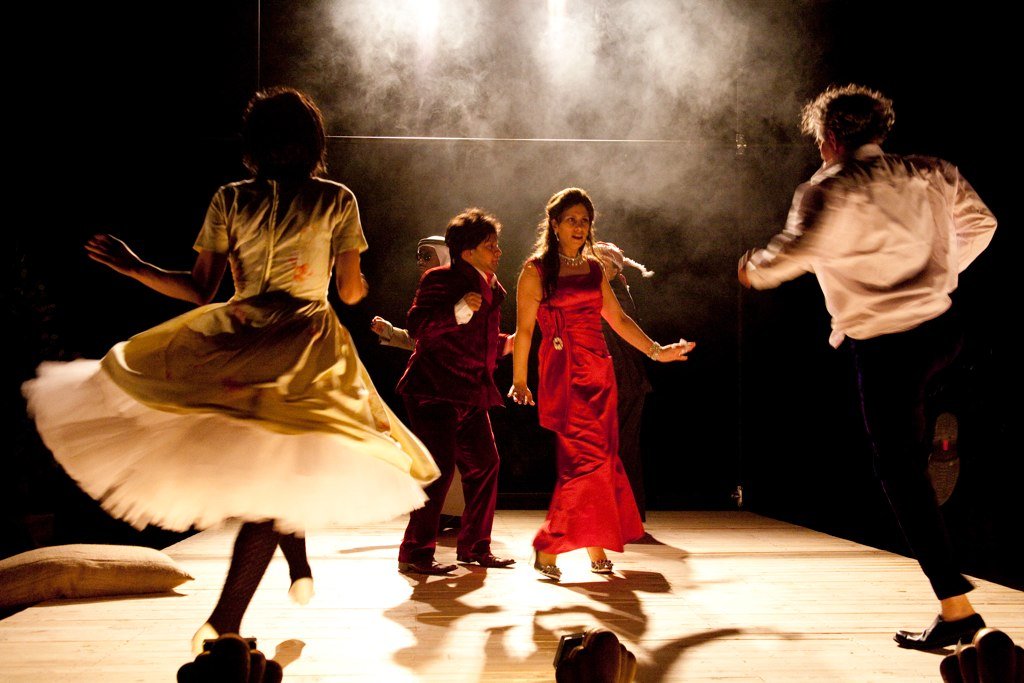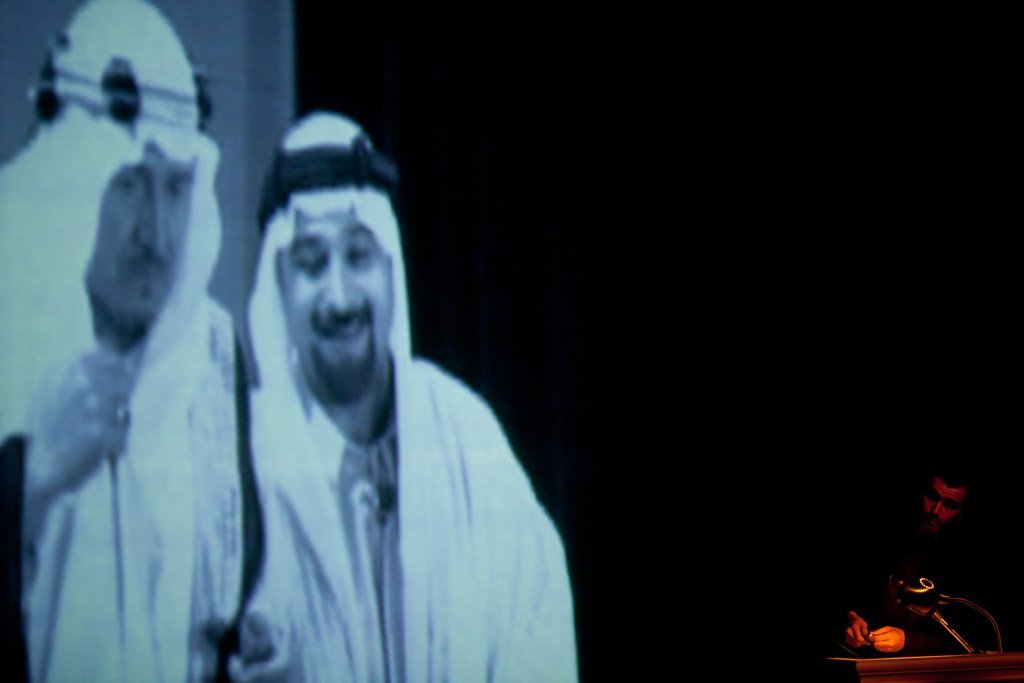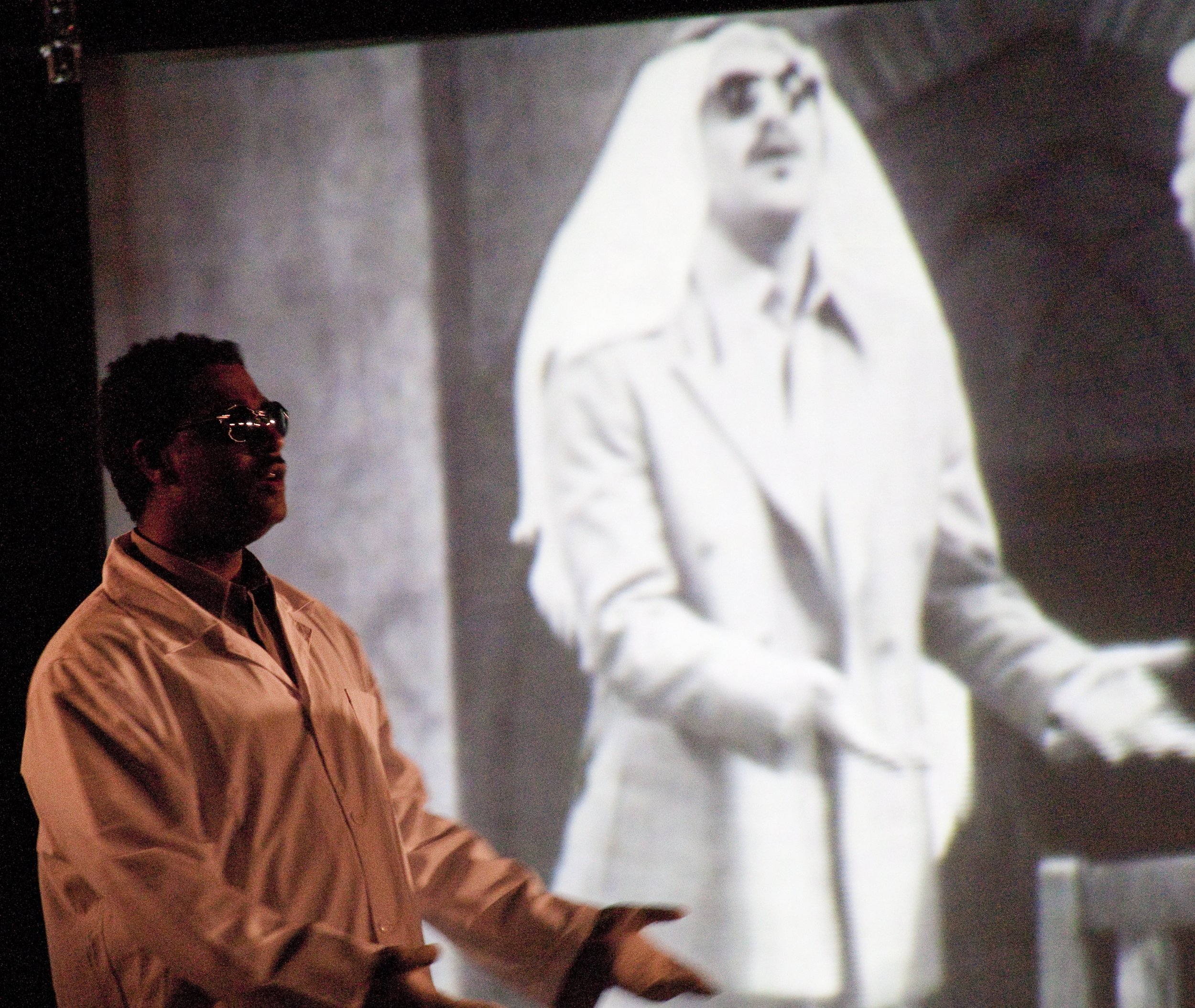
The Speaker’s Progress
The Speaker’s Progress , 2011-12
Credits
Co-conceived by Georgina Van Welie & Sulayman Al Bassam
Written and Directed by Sulayman Al Bassam
Script Editor: Georgina Van Welie
Production Design: Sam Collins
Composer/Sound Design: Lewis Gibson
Lighting Design: Marcus Doshi
Costume Design: Abdullah Al Awadhi
Assistant Director: Nigel Barrett
Cast:
The Girl-Boy: Amal Omran
The Lady: Carole Abboud
The Ruler/The Clown: Faisal Al Ameeri
The Mullah: Fayez Kazak
The Speaker: Sulayman Al Bassam
The Drunken Uncle: Nicolas Daniel
The Uncle’s Sidekick: Nassar Al Nassar
The Lady’s Maid: Nowar Yousef
Musician: Lewis Gibson/Tom Parkinson
1963 filmed cast includes:
Jassim Al Nabhan, Oussama Al Muzail, Yousef Al Hashash, Hussah Al Nabhan, Showq, Amani Behbehani, Mohsin Al Qaffas, Essa Thiyab, Mohammed Akwa
With thanks to Hanan Hajj Ali for her appearance in the filmed footage
Technical Director: Saad El Shaarawy
Assistant Technical Director: Mohammed Sadik
Production Manager: Aude Albiges
Surtitles Director/Company Manager: Wafa’a Al Fraheen
Touring Stage Manager: Faisal Al Obaid/Dana Mikhail
Running time, 90 minutes without interval
Performed in Arabic and English (with surtitles)
Premiere: Al Maidan Cultural Centre, Kuwait.
US Premiere: Brooklyn Academy of Music (BAM) New York, USA.
Touring performances: Beirut Medina Theatre; New York, New Wave Festival; Boston, Arts Emerson, Tunis,, JTC Festival; Cairo D-Caf Festival; Amsterdam, Holland Festival.
In a totalitarian state, somewhere in the Arab World apparently inured to the changes sweeping across the region, all forms of theatre and public gatherings have recently been banned. But a condemned 1960’s performance of Twelfth Night has become the focal point for resistance blogs and underground, dissident social networks. The state, eager to quell this dangerous mixture of nostalgia and dissent commissions The Speaker, a once radical theatre maker now turned regime apologist, to make a forensic reconstruction and public denunciation of the 1960’s piece. As The Speaker and his group of non-acting volunteers delve deeper into the ‘reconstruction’, they find themselves increasingly engaged with the condemned material they are supposed to be condemning and discover in the act of performance – and the growing complicity of their audience – a solidarity that transforms the gathering into an unequivocal act of defiance towards the state.
A dark satire on the decades of hopelessness and political inertia that have fed recent revolts across the Arab region. A daring theatrical metaphor for the mechanisms of dissent.
Director’s Note: In the Shadow of Bigger Things
It is hard to overstate the seismic nature of the changes that have taken place across the Arab world in the period between this production’s birth in 2011 and it’s untimely death in 2012. The Speaker’s Progress was first written in October 2010 – three months before the tumultuous events of the Arab Spring started. It was intended as the final part of a trilogy of Arab Shakespeares. This body of work that charts, through the prism of Shakespeare, a decade of turbulence in the Middle East region, was to be concluded with a black satire on the inertia that crippled the Arab World, a bleak cry of despair and an avowal that theatre – political theatre – could change nothing in a world where nothing could be changed.
But History – that for decades had moved at a glacial pace – was now overtaking us. Even as rehearsals began in January 2011, the structures of the world around us were trembling. By the time the work previewed in Kuwait a month later, two dictators had fallen and, as a result, the ending of the piece was altered to encompass the mounted charge of History! As I write now, another dictator is about to be hounded out of power onto the dust heap of history; the fate of the free and yet-to-be free is still in the balance. In the lapse between this moment of writing and our performances at BAM, who knows what other time-honored temples of oppression will have crumbled or what fragile bubbles of hope, popped.
Within this crucible of change, revolutions and counter-revolutions, the metaphor of theatre as an expression of freedom – with Shakespeare’s Twelfth Night as the inset jewel that refracts it – has remained central to the process of creation. The Speaker’s shedding of the Shakespearian mask in the final moments of the play is the natural conclusion of the death of censorship. When systems of oppression crumble so, too, do the masks and texts we used to criticize them. What is spoken then, after the fall, are the tentative ciphers of a new, unwritten text, daunting in its vastness and obscurity: that is the text of freedom.
The fact that we were able to give birth and play this production in those tumultuous times is a tribute to the commitment of the actors in this production, their courage and devotion to their art was remarkable.



